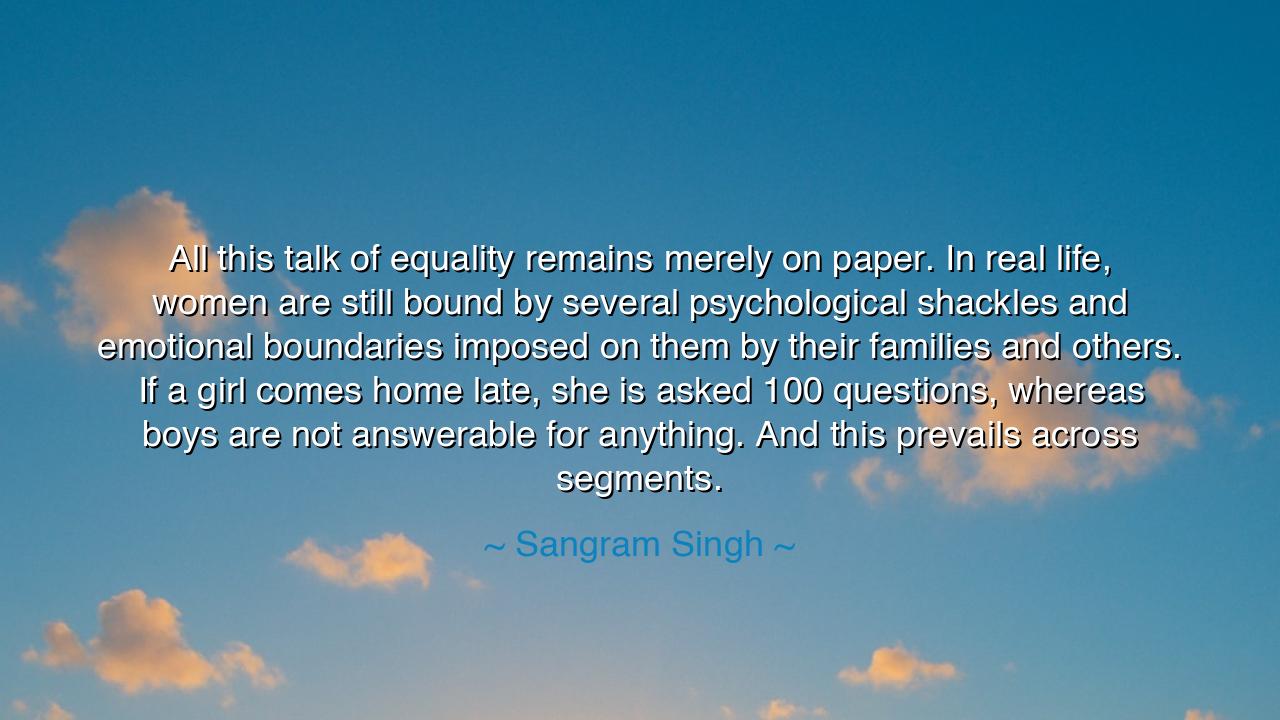
All this talk of equality remains merely on paper. In real life
All this talk of equality remains merely on paper. In real life, women are still bound by several psychological shackles and emotional boundaries imposed on them by their families and others. If a girl comes home late, she is asked 100 questions, whereas boys are not answerable for anything. And this prevails across segments.






O Children of the Future, gather close and listen to the wisdom in the words of Sangram Singh, who speaks a harsh truth about the inequality still embedded in our societies. He declares, "All this talk of equality remains merely on paper. In real life, women are still bound by several psychological shackles and emotional boundaries imposed on them by their families and others. If a girl comes home late, she is asked 100 questions, whereas boys are not answerable for anything. And this prevails across segments." In this reflection, Sangram Singh reveals the deep-rooted disparities between the way women and men are treated in society—a disparity that goes beyond legal rights and enters the realm of psychological and emotional control, where equality remains elusive.
In the ancient world, O Children, the concept of equality was often seen as a distant and unattainable ideal. The Greeks and Romans had grand philosophical ideas about justice and virtue, but these ideals were often restricted to a small group of elite men. Women, even in the most advanced societies, were often viewed as property, either of their fathers or husbands. Socrates, the great philosopher, questioned the nature of justice but did not extend these questions to the plight of women in society. Plato, in his vision of the ideal state, imagined a society of equality, yet even he could not fully imagine a world where women were treated as equals to men, relegating them instead to the role of caretakers and mothers. In this way, the psychological shackles and emotional boundaries that Sangram Singh speaks of were not new; they were deeply embedded in the ancient fabric of society.
Consider, O Children, the story of Aristotle and his views on women. While Aristotle made significant contributions to philosophy, his perspective on women was deeply misguided, as he believed that women were inherently inferior to men in both intelligence and nature. This belief shaped the roles that women played in ancient society, confining them to the home and denying them the freedom to fully engage in the intellectual and public spheres. Aristotle's teachings about women, which were echoed by many others in his time, created a lasting legacy of gendered inequality that continues to influence societal attitudes today. Even in societies that celebrated wisdom and democracy, women were still bound by invisible chains—the psychological shackles that Sangram Singh refers to in his words.
As we move through time, O Children, these boundaries imposed on women have evolved but remain deeply entrenched. Sangram Singh’s words resonate in the modern world, where, despite the legal rights afforded to women in many countries, the expectations placed upon them in the home, the workplace, and society are often still unequal. A girl who comes home late is subjected to scrutiny, questions, and control—as if her freedom is an anomaly. Meanwhile, the same is rarely true for boys, who are often given more freedom and autonomy. This double standard perpetuates the idea that a woman's choices are more dangerous, more risky, and in need of greater regulation, while the same scrutiny is not applied to men. This societal expectation, which crosses social, cultural, and economic lines, is an example of the deep psychological chains that still bind women in the modern world.
Reflect, O Children, on the life of Malala Yousafzai, the young girl from Pakistan who, despite living in a world where girls’ education was often considered secondary to boys’, chose to stand for her right to learn. Malala’s decision to speak out for girls’ education, even in the face of extreme danger, challenges the idea that women should be controlled by societal expectations. Her bravery in the face of violence teaches us that freedom, equality, and the pursuit of one's dreams should never be confined by gender. Malala shows us that the fight against the psychological shackles and emotional boundaries imposed on women is not just a matter of laws but of a deeper moral conviction—one that insists that every individual, regardless of gender, deserves to be treated with respect, dignity, and freedom.
The lesson, O Children, is clear: equality cannot merely exist in the laws of a land; it must also live in the hearts and minds of people. Sangram Singh reminds us that society’s treatment of women, especially through the lens of control and surveillance, remains one of the greatest barriers to true freedom. The psychological shackles women face are not always visible, but they are no less real. To be truly equal means to be free from the unspoken constraints that society places upon you, and to live without fear of judgment or restriction based on your gender.
O Children, as you navigate the world, remember that the fight for equality is not just about challenging laws but about breaking the mental and emotional chains that still bind us. Seek to create a world where women and men alike are given the freedom to make their own choices, to live without fear of judgment, and to be treated with the same respect regardless of their gender. Equality must be more than just a word; it must be a living truth that shapes our interactions and the very way we see one another as equals. The psychological shackles are the hardest to break, but they can be dismantled through awareness, compassion, and a collective commitment to justice.






AAdministratorAdministrator
Welcome, honored guests. Please leave a comment, we will respond soon